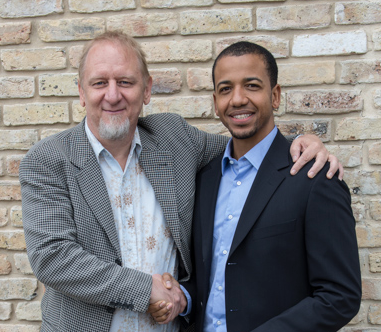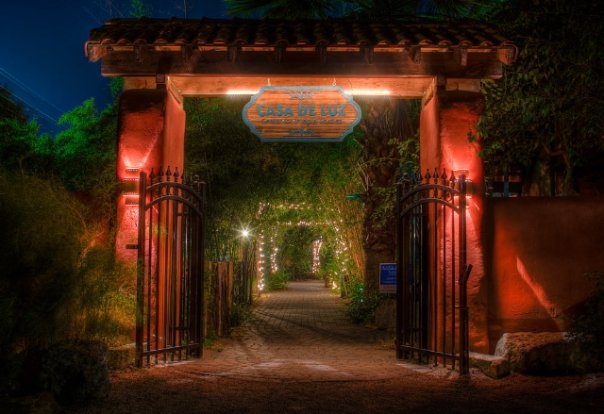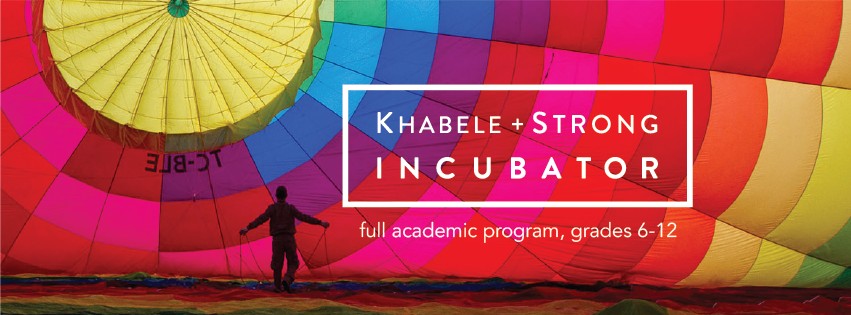Last August, Khotso Khabele, founder of the Khabele School, and Michael Strong, co-founder of Conscious Capitalism, co-founded the Khabele + Strong Incubator (KSI) at Casa de Luz. KSI provides a world-class college prep school program while developing teens to become successful conscious entrepreneurs. KSI is open for grades 6-12 for the 2015-2016 school year. Last year KSI students experienced SAT gains that were more than double the average produced by SAT prep programs – all while developing fascinating real world entrepreneurial projects.
With two simple principles in place, the Incubator is designed to help kids succeed in a college of their choice. By preparing them for college admissions and teaching them how to live an entrepreneurial life, Khabele + Strong students will come out ahead and ready for any college education or post-graduation path they pursue.
A typical day at Khabele + Strong will look like this:
- 9 – 9:30 am -> Khotso Khabele will hold a morning meeting in which students and teachers will get focused and motivated to have a productive day. Any issues will be discussed so that everyone can be at their very best.
- 9:30 am – noon -> Independent work period in which faculty will be available to help students with their core academics. Students will have individual academic goals in math, writing, history and so forth. Sometimes, they’ll work toward these goals in small groups, but mostly they will work independently.
- 12 – 1 pm -> Lunch
- 1 – 2 pm -> Socratic discussions
- 2 – 3 pm -> Conscious entrepreneurship
- 3 – 4 pm -> Electives including 3D printing, parkour, yoga, theatre, improv, Spanish and other interesting opportunities.
We had a chance to talk with one of the founders of the school, Michael Strong, and asked him a few questions about this new endeavor. Here is what he had to say.
___________________________

Do512 Family: Give us the basic rundown of the Khabele + Strong Incubator and a few of its principles.
Michael Strong: Khotso (Khabele) and I designed this school because we believed that conventional schooling doesn’t prepare children well for the 21st century.
There are two destinations that we believe every 18-year-old should have available to them. One is college admissions – the option is to apply to as many colleges as possible. The other is what I call an entrepreneurial life. They should be ready to live as an entrepreneur based on their own skills and abilities, even if they work for other people.
With respect to the college admissions, we’re very focused on the essential aspects of getting into college which is a three-fold. One is SAT, they need to be well prepared to do very well on the SAT’s. The other is they need to be capable of passing two or three Advanced Placement (AP) courses. And the third is to be amazing.
When I went to Harvard, there was a student who had been elected Mayor of his small town in Michigan at the age of 18 and he had the lowest SAT scores of anybody in my class. The fact is, if you can get yourself elected Mayor of a small town by the age of 18, SAT scores are less important. There are some students who have developed their own software companies, students who have written novels, students who have started their own bands and performed… there are a lot of different ways to be amazing.
Our program is designed so that students can pursue their passions and become excellent at something while developing very high SAT scores, preparing for AP tests, and packaging themselves as an entrepreneurial person who can do things in the world and add value to companies and projects.
How do you plan on helping them find their amazing, or hone in on their amazing-ness?
Two general strategies.
One is through Socratic discussions. My specialty as an educator is Socratic discussion, where we read and think about ideas across the disciplines.
The other is conscious entrepreneurship. For the last 10 years, I have led a non profit (FLOW) that I co-founded with John Mackey of Whole Foods that promotes entrepreneurial solutions to world problems. I have one of the best networks of social entrepreneurs in the world, and we will actually expose kids to diverse projects, mostly in developing countries. Students will see how a conscious entrepreneur either helped raise funds for education in the Congo, or helped women in Guatemala wash their clothes without electricity, or my wife’s Senegalese company that produces skincare products based on indigenous Senegalese recipes.
In various ways the kids will learn about and start working on these to see what a real world conscious entrepreneur does and how they do it. We believe that this kind of exposure will stimulate many of them to try, or actually create, their own company over time where they can start solving a problem in a way that they think is most effective.
It doesn’t have to be a conscious entrepreneurship project in which they’re amazing, but we want to encourage that kind of thinking where they take whatever skills or talents they have and apply it to making the world a better place.
We’ll have a steady stream of entrepreneurs coming in presenting their ideas and explaining how their companies work. For projects that are local we’ll go on field trips. If students are interested in a potential project then they can intern on one of the local conscious entrepreneur’s projects
Why do you feel the Socratic discussions are so important?
The Socratic discussion does several things simultaneously. If you look at the verbal SAT it’s largely college level reading with nuanced questions about that reading. In the Socratic discussions, teens will read college level material and discuss it.
It also develops the teen’s writing because if one spends a lot of time discussing ideas, it becomes very natural to know how to defend their ideas. We can use that to teach analytical writing, or essay writing, which in some ways is the most important kind of writing for college.
We want them to become powerful independent thinkers where they develop their own beliefs about who they are, what’s important to them, what their moral beliefs and values are and that they learn to stand up for themselves and stand up for what they believe in. Within the one integrated activity of Socratic dialogue, students can develop a variety of personal and academic skills.
Anything you’d like to add?
Austin is THE BEST place for this school at this time in history. Many of our parents are entrepreneurs or creative professionals. This demographic really understands why we need to take this leap in education.
___________________________

Michael Strong and Khotso Khabele will be conducting free talks about reshaping education that are free to attend. These talks will be held at Casa de Luz in the middle school classroom (up the green staircase by the KSI banner as you enter the gate).
Schedule:
— Wednesday, August 5, 7 p.m. -> Reshaping Education with Khotso Khabele — Is Your Teen Immersed in a Culture for Thriving?
— Wednesday, August 12, 7 p.m. -> Reshaping Education with Michael Strong — How to Develop High SAT Scores While Maintaining a Love of Learning
— Wednesday, August 19, 7 p.m. -> Reshaping Education with Khotso Khabele — “Our future is set for massive changes — Empower your teen to be ready for the challenge”
If you are interested in sending your child to the school, you can schedule a face-to-face meeting with one of the founders so that you can have all of your questions answered. Email info@khabelestrong.org or call 512-910-5331.
You can find more info on the Khabele + Strong Incubator website or by following Khabele + Strong on Facebook. You can also check out Michael Strong’s talks on TEDx Talks here, here and here.
— J Jett










